Susan Bernofsky's Blog, page 21
October 9, 2017
2017 ALTA Awards Announced
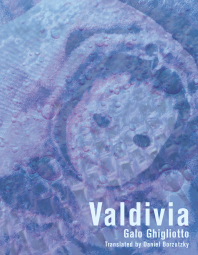 Just back from a whirlwind 40th Anniversary ALTA Conference in Minneapolis, where (among other things), the winners of ALTA’s various prizes were announced, including the National Translation Awards (NTA) in poetry and prose as well as the Italian Prose in Translation Award (IPTA), the Lucien Stryk Prize for a work translated from an Asian language, and the Cliff Becker Prize for an unpublished work of poetry (winner to be published in a bilingual edition from White Pine Press).
Just back from a whirlwind 40th Anniversary ALTA Conference in Minneapolis, where (among other things), the winners of ALTA’s various prizes were announced, including the National Translation Awards (NTA) in poetry and prose as well as the Italian Prose in Translation Award (IPTA), the Lucien Stryk Prize for a work translated from an Asian language, and the Cliff Becker Prize for an unpublished work of poetry (winner to be published in a bilingual edition from White Pine Press).
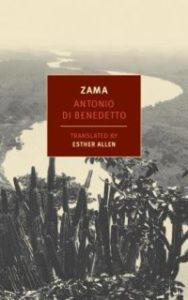 You’ll find shortlists and longlists for some of these prizes on the ALTA blog (and here). But to cut to the chase, here are this year’s winning translators
You’ll find shortlists and longlists for some of these prizes on the ALTA blog (and here). But to cut to the chase, here are this year’s winning translators
National Translation Award in Prose:
Esther Allen, for her translation of Zama by Antonio di Benedetto (NYRB Classics)
National Translation Award in Poetry:
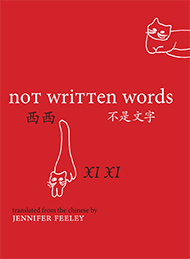
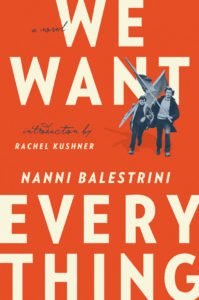 Daniel Borzutzky, for his translation of Valdiva by Galo Ghigliotto (co•im•press)
Daniel Borzutzky, for his translation of Valdiva by Galo Ghigliotto (co•im•press)
Lucien Stryk Prize:
Jennifer Feeley, for Not Written Words by Xi Xi (Zephyr Press)
Italian Prose in Translation Award
Matt Holden, for We Want Everything by Nanni Balestrini (Verso Books)
Cliff Becker Prize:
Anne Fisher and Derek Mong for The Wondrous Science by Maksim Amelin.
Congratulations to all the translators honored with these awards!
The post 2017 ALTA Awards Announced appeared first on TRANSLATIONiSTA.
October 2, 2017
American Academy of Poets Announces New Translation Prize
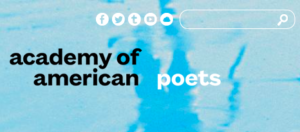 The American Academy of Poets has just added a new translation prize, the Ambroggio Prize, to its other yearly translation prizes. The Ambroggio Prize is a $1000 award for a book-length manuscript of poetry translated from Spanish; the winning book will be published by Bilingual Press/Editorial Bilingüe. This year’s judge will be Alberto Ríos, applications due Feb. 15, 2018.
The American Academy of Poets has just added a new translation prize, the Ambroggio Prize, to its other yearly translation prizes. The Ambroggio Prize is a $1000 award for a book-length manuscript of poetry translated from Spanish; the winning book will be published by Bilingual Press/Editorial Bilingüe. This year’s judge will be Alberto Ríos, applications due Feb. 15, 2018.
Other awards offered by The American Academy of Poets include the Raiziss/de Palchi Translation Awards for translations into English of modern Italian poetry, and the Harold Morton Landon Translation Award, for a poetry collection translated from any language into English. For application guidelines and more information, visit the American Academy of Poets website.
The post American Academy of Poets Announces New Translation Prize appeared first on TRANSLATIONiSTA.
October 1, 2017
Translation on Tap in NYC, Oct. 1 – 31, 2017
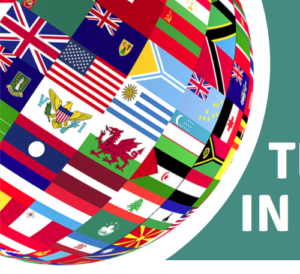 It’s October! Now that it’s cool enough to actually be indoors, you’ll be wanting to hear some translation events. Here are some for you to choose from:
It’s October! Now that it’s cool enough to actually be indoors, you’ll be wanting to hear some translation events. Here are some for you to choose from:
Monday, Oct. 2:
The Babel Duet: Translator, poet, and musician Aurélia Lassaque joins Alima Hamel for an evening of poems and songs in English, French, Occitan, and Algerian. Hosted by Andrew Singer of Trafika. Admission $10. More information here. Bowery Poetry Club, 308 Bowery, 6:00 p.m.
Thursday, Oct. 5:
Launch event for the CCNY Latino / Latin American Writers issue of Review: Literature and Arts of the Americas, with remarks and/or readings by translators Daniel Shapiro (also the editor of the journal), Edith Grossman, Raquel Chang-Rodríguez, and David Unger, as well as Ernesto Quiñónez, Lori Marie Carlson, Jerry W. Carlson, Lyn Di Iorio, Jaime Manrique, Leonardo Padura, and Luis Rafael Sánchez. City College Faculty Dining Room, North Academic Center (NAC), 3rd fl., 160 Convent Ave., 5:30-8:30 p.m.
Thursday, Oct. 19:
Translator Katrine Øgaard Jensen moderates a reading and talk with Josip Novakovich, Miroslav Penkov, and Stacy Mattingly organized by the Elizabeth Kostova Foundation, Bulgarian Consulate, 121 E 62nd St., 7:00 p.m.
Friday, Oct. 20:
Us & Them: The Fall 2017 installment of this reading series featuring writers who are also translators reading both their own and translated work will present Laura Marris translating Louis Guilloux (Brittany); David Larsen translating cat poems from Classical Arabic; Kyle Dacuyan translating Hervé Guibert (France); and Todd Portnowitz translating Lorenzo Carlucci (Italy). Molasses Books, 770 Hart St. (Dekalb L), Brooklyn, 8:00 p.m.
Friday, Oct. 20 – Saturday, Oct. 21:
Twin Translation Conference Weekend
Registration fee (discounted for students), register in advance, lunch provided. All events held at New York University @ Woolworth Building, 15 Barclay St., 10:00 – 4:00.
Friday, Oct. 20:
Complexity and Translation: 7th Annual Translation Studies Research Symposium presented by the Nida School of Translation Studies, featuring Kobus Marais in conversation with David Vampola and a panel discussion with Maria Tymoczko and Salah Basalamah. More information here.
Saturday, Oct. 21:
2nd Annual Translation Symposium presented by New York University’s School of Professional Studies.
Program Overview:
• 10:00-11:00 am – Technologies in Project Management
• 11:15 am-12:15 pm – WeChat Translation Contest
• 12:15-1:00pm – Lunch (provided)
• 1:00-2:00 pm –Translate, Interpret, or Both in the Age of MT
• 2:00-3:00 pm – Alumni Reporting: The Latest Technologies & The Translation Marketplace
• 3:00-4:00 pm – Closing Reception
The post Translation on Tap in NYC, Oct. 1 – 31, 2017 appeared first on TRANSLATIONiSTA.
September 13, 2017
2017 Warwick Prize for Women in Translation Longlist Announced
I was so thrilled to learn of the existence of the Warwick Prize, the long-awaited first-ever prize honoring the work of women in translation – i.e. books written by women and translated by people of any gender – and am even more thrilled to have a book on their first-ever longlist. It’s a juicy list too – look how many great writers and translators are represented!
The Art of being a Tiger by Ana Luísa Amaral, translated from Portuguese by Margaret Jull Costa (Liverpool University Press, 2016)
The Song of Seven by Tonke Dragt, translated from Dutch by Laura Watkinson (Pushkin Children’s Books, 2016)
Clementine Loves Red by Krystyna Boglar, translated from Polish by Antonia Lloyd-Jones and Zosia Krasodomska-Jones (Pushkin Children’s Books, 2016)
Second-hand Time by Svetlana Alexievich, translated from Russian by Bela Sheyavich (Fitzcarraldo Editions, 2016)
Life Begins on Friday by Iona Pârvulescu, translated from Romanian by Alistair Ian Blyth (Istros Books, 2016)
Memoirs of a Polar Bear by Yoko Tawada, translated from German by Susan Bernofsky (Portobello Books, 2016)
The Fox was ever the Hunter by Herta Müller, translated from German by Philip Boehm (Portobello Books, 2016)
Eva Sleeps by Francesca Melandri, translated from Italian by Katherine Gregor (Europa Editions, 2016)
Mirror, Shoulder, Signal by Dorthe Nors, translated from Danish by Misha Hoekstra (Pushkin Press, 2017)
Swallowing Mercury by Wioletta Greg, translated from Polish by Eliza Marciniak (Portobello Books, 2017)
Fever Dream by Samanta Schweblin, translated from Spanish by Megan McDowell (Oneworld Publications, 2017)
Swallow Summer by Larissa Boehning, translated from German by Lyn Marven (Comma Press, 2016)
The Dutch Maiden by Marente de Moor, translated from Dutch by David Doherty (World Editions, 2016)
Record of a Night Too Brief by Hiromi Kawakami, translated from Japanese by Lucy North (Pushkin Press, 2017)
Mårbacka by Selma Lagerlöf, translated from Swedish by Sarah Death (Norvik Press, 2016)
The Coast Road by Ailbhe Ní Ghearbhuigh, translated from Irish by Michael Coady, Peter Fallon, Tom French, Alan Gillis, Vona Groarke, John McAuliffe, Medbh McGuckian, Paul Muldoon, Michelle O’Sullivan, Justin Quinn, Billy Ramsell, Peter Sirr and David Wheatley (The Galley Press, 2016)
This year’s prize is being judged by Boyd Tonkin, Susan Bassnett, and Amanda Hopkinson. Expect a shortlist in early October, and an announcement of the winner at a ceremony at the Warwick Arts Centre on Wednesday, Nov. 15. More information on the Warwick Prize website.
Meanwhile, if you were looking for a good book to read or give as a gift, here are 16 great suggestions!
The post 2017 Warwick Prize for Women in Translation Longlist Announced appeared first on TRANSLATIONiSTA.
September 10, 2017
Translation on Tap in NYC Sept. 1 – 30, 2017
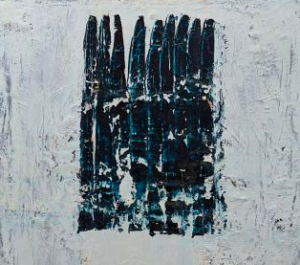 Welcome back, translation fans! Between the weather, fires, and the nightmares in Washington, D.C. and apparently everywhere else, it’s been hard to focus on things like making beautiful translated work and publicizing it, so I haven’t heard about as many events as would be usual this time of year. But maybe you have? Please send them along!
Welcome back, translation fans! Between the weather, fires, and the nightmares in Washington, D.C. and apparently everywhere else, it’s been hard to focus on things like making beautiful translated work and publicizing it, so I haven’t heard about as many events as would be usual this time of year. But maybe you have? Please send them along!
Here’s what I’ve got so far:
Tuesday, Sept. 12:
La Deliciosa Show Poetry Readings: Translator Karen Emmerich joins four other readers on the High Line in Radamés “Juni” Figueroa’s site-specific installation “La Deliciosa Show.” Free with RSVP, more information here. High Line, 30th St./10th Ave. entrance, 6:30 p.m.
Tuesday, Sept. 19:
Launch event for The Communist by Guido Morselli featuring translator Frederika Randall joined by Katha Pollitt. More information here. Community Bookstore, 143 7th Ave., Brooklyn, 7:00 p.m.
Sunday, Sept. 24:
Gates & Fields: Poet and translator Cole Swensen joins Jennifer Firestone in conversation to launch Firestone’s new book of poems, more information here. McNally Jackson Books, 52 Prince St., 7:00 p.m.
The post Translation on Tap in NYC Sept. 1 – 30, 2017 appeared first on TRANSLATIONiSTA.
September 8, 2017
Nominate Your Hero for the 2018 PEN/Ralph Manheim Medal
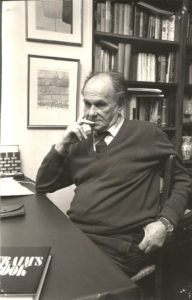
Ralph Manheim
Every three years, a literary translator is honored with the PEN/Ralph Manheim Medal “whose career has demonstrated a commitment to excellence through the body of their work.” The prize was named for the incredibly prolific Ralph Manheim, who translated from Dutch, Serbo-Croatian, and Polish as well as French and German and brought us the work of many important international authors including Günter Grass, Céline, Aimé Cesaire, and Peter Handke. Recent recipients of the Manheim medal include Michael Henry Heim, Margaret Sayers Peden, and Burton Watson. Its first recipient was Gregory Rabassa in 1982, its first female recipient Edith Grossman in 2006. Nominations for the award are accepted from all current PEN members, and the recipient is then voted on by the PEN Translation Committee. Time is running out to submit your nominations – they will be accepted only until Sept. 15, 2017.
Coincidentally, Sept. 15 is also the deadline for 2018 PEN/Heim Translation Fund applications. Please apply now!
The post Nominate Your Hero for the 2018 PEN/Ralph Manheim Medal appeared first on TRANSLATIONiSTA.
September 5, 2017
Apply Now for a 2018 PEN/Heim Translation Fund Grant
 PEN/Heim Translation Fund Grants (named for Michael Henry Heim, who founded these awards fourteen years ago now with his wife Priscilla) are one of the best ways out there for younger or otherwise emerging translators to draw attention to their work and possibly even find a publisher as well as receiving $2000 – $4000 of financial support. I’ve written about the ins and outs of them before. These grants are explicitly open to those early in their careers – though everyone is welcome to apply. As of last year, this competition comes bundled with the new separately funded PEN Grant for the English Translation of Italian Literature (with a purse of $5000). All PEN/Heim applications for Italian-language projects will automatically be considered for it. So if you’re thinking about a book-length project and have a sample translation already in progress, time to sharpen your pencils. You’ll find more information and full application instructions on the PEN America website. Deadline for the receipt of applications is Sept. 15, 2017.
PEN/Heim Translation Fund Grants (named for Michael Henry Heim, who founded these awards fourteen years ago now with his wife Priscilla) are one of the best ways out there for younger or otherwise emerging translators to draw attention to their work and possibly even find a publisher as well as receiving $2000 – $4000 of financial support. I’ve written about the ins and outs of them before. These grants are explicitly open to those early in their careers – though everyone is welcome to apply. As of last year, this competition comes bundled with the new separately funded PEN Grant for the English Translation of Italian Literature (with a purse of $5000). All PEN/Heim applications for Italian-language projects will automatically be considered for it. So if you’re thinking about a book-length project and have a sample translation already in progress, time to sharpen your pencils. You’ll find more information and full application instructions on the PEN America website. Deadline for the receipt of applications is Sept. 15, 2017.
The post Apply Now for a 2018 PEN/Heim Translation Fund Grant appeared first on TRANSLATIONiSTA.
August 24, 2017
2017 ALTA Mentorships Announced
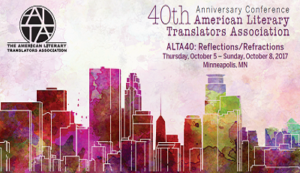 The Emerging Translator Mentorship Program of the American Literary Translators Association is now entering its third year, and the 2017 cohort of translators selected to be mentored through the program – now expanded to include eight mentorships – has just been announced. Here they are:
The Emerging Translator Mentorship Program of the American Literary Translators Association is now entering its third year, and the 2017 cohort of translators selected to be mentored through the program – now expanded to include eight mentorships – has just been announced. Here they are:
Madeleine Campbell (Non-Language-Specific Poetry)
Marci Calabretta Cancio-Bello (Korean Poetry)
Reilly Costigan-Humes (Russian Prose)
Marlena Gittleman (Catalan)
E. J. Koh (Korean Poetry)
Joungmin Lee Comfort (Korean Prose)
Zoë McLaughlin (Non-Language-Specific Prose)
Isaac Stackhouse Wheeler (Russian Prose)
Mentors for the 2017-18 ALTA Mentorship are Mara Faye Lethem (Catalan), Sora Kim-Russell (Korean prose), Don Mee Choi (Korean poetry), Marian Schwartz (Russian prose), Bill Johnston (Non-Language-Specific Prose), and Steven Bradbury (Non-Language-Specific Poetry).
The translators selected for the program will present their work at a special lunchtime reading during the ALTA Conference in October. Have you registered yet?
For more information on the mentors, mentees, and sponsors for this program, visit the ALTA blog.
The post 2017 ALTA Mentorships Announced appeared first on TRANSLATIONiSTA.
August 22, 2017
2017 Lucien Stryk and IPTA Shortlists Announced
Among ALTA’s (American Literary Translators Association) many activities, it gives out translation prizes at its annual conference – this year to be held in Minneapolis, Oct. 5 – 8, 2017. The shortlists for two of these have just been announced: the Italian Prose in Translation Award (IPTA), and the Lucien Stryk Prize, given for a work translated from an Asian language. Each prize comes with a $5000 purse. The winning translations will be announced at the conference, as well as Twitter (@LitTranslate) and Facebook (www.facebook.com/literarytranslators).
Behold the lists!
2017 Lucien Stryk Prize shortlist:
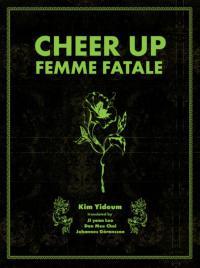 Cheer Up: Femme Fatale
Cheer Up: Femme Fatale
By Kim Yideum
Translated from the Korean by Ji Yoon Lee, Don Mee Choi, and Johannes Göransson
(Action Books)
The question isn’t, Kim Yideum appears to say, “what’s real?”—it’s “what’s present?” And what’s present is everything: flowers, fetuses, phantasms, time, trash, and history. In Kim’s poems, the erasures (of war, occupation, exploitation, political murders) and the scrubbed efficiencies of contemporary South Korea get filled up and haunted by rank matters, recalcitrant ghosts. Her canny translators treat this plenum as the site of glorious excess: Ji yoon Lee, Don Mee Choi, and Johannes Göransson’s English makes this book buzz with pleasures, terrors, and anxieties. Their tools are narrative verve, incantatory force, and a generous reception of the strange. In the absence of absence, we’re made to (re)cognize a world we can’t transcend: “Instead we’ll be swallowed up … we’ll be earnestly consumed.”
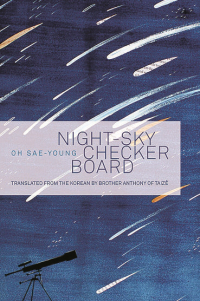 Night-Sky Checkerboard
Night-Sky Checkerboard
By Oh Sae-young
Translated from the Korean by Brother Anthony of Taizé
(Phoneme Media)
Oh Sae-young writes nature poetry and politically engaged poetry–often at the same time. His elegy for a landscape that has been irretrievably altered at the hands of humans elides with one for the people who have been damaged by the onslaught of industrialization and globalization as much as the land around them. An unpicked gourd after a frost is a businessman dangling from a rope in his office after a similar freeze in the stock market, a disposable paper cup is a laid-off worker, and a protester on a crane the last leaf on a tree. A translator might be tempted to smooth over these blunt metaphors in parts of the work, but Brother Anthony does not flinch from the unvarnished comparisons, and his direct, simple language reveals its power in more complicated passages where this valorized nature can only be described in terms of the civilization displacing it, as when a farmer’s irrigation canals are described in terms of an electrical grid, or a meandering waterway in spring becomes writing itself.
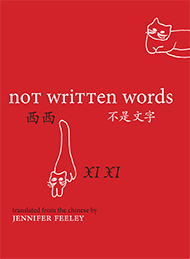 Not Written Words
Not Written Words
By Xi Xi
Translated from the Chinese by Jennifer Feeley
(Zephyr Press)
Jennifer Feeley’s superb translation captures all of the creativity, intellect, and playfulness in the verse of premier Hong Kong poet Xi Xi. In these skillfully wrought and daring poems, Feeley employs all the tools of the English language, including unforced end and internal rhyme, alliteration, wordplay, and references that run the gamut from nursery rhymes and fairy tales to fine art to contemporary politics. In deceptively lighthearted poems such as “Excerpt from a Feminist Dictionary,” the verse rings as powerfully in the English as it does in the original Chinese. This translation is essential reading, providing a window into the rich literature of Hong Kong and the larger Sinophone world.
2017 IPTA Shortlist:
 Distant Light
Distant Light
By Antonio Moresco
Translated from the Italian by Richard Dixon
(Archipelago Books)
 Eva Sleeps
Eva Sleeps
By Francesca Melandri
Translated from the Italian by Katherine Gregor
(Europa Editions)
 Primo Levi’s Resistance: Rebels and Collaborators in Occupied Italy
Primo Levi’s Resistance: Rebels and Collaborators in Occupied Italy
By Sergio Luzzatto
Translated from the Italian by Frederika Randall
(Metropolitan Books)
 We Want Everything
We Want Everything
By Nanni Balestrini
Translated from the Italian by Matt Holden
(Verso Books)
For more information on the shortlisted books see the official shortlist announcements for the Lucien Stryk Prize and IPTA on the ALTA blog.
The post 2017 Lucien Stryk and IPTA Shortlists Announced appeared first on TRANSLATIONiSTA.
August 18, 2017
Tips for Beginning Translators
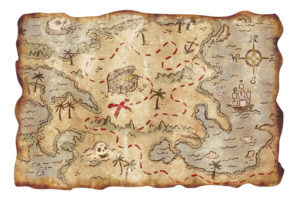 It’s not as if every young and/or aspiring translator is the same as every other one, but I do get a lot of notes asking basically the same thing: If I’m interested in breaking into the field of literary translation, how do I start? How do I get published? Here’s the sort of advice I tend to give out, starting with the question: You do understand that being a literary translator is not a way to make a living without a day job, right? If that’s all right with you, keep reading.
It’s not as if every young and/or aspiring translator is the same as every other one, but I do get a lot of notes asking basically the same thing: If I’m interested in breaking into the field of literary translation, how do I start? How do I get published? Here’s the sort of advice I tend to give out, starting with the question: You do understand that being a literary translator is not a way to make a living without a day job, right? If that’s all right with you, keep reading.
For starters, you should be submitting your work to literary magazines. These don’t have to be magazines that specialize in translation; most literary mags are happy to consider translated work, especially if you let them know in your cover letter that you’ve already looked into the rights situation. As with any other work you’d submit to a magazine, you should take care to match your submission to the magazine’s aesthetic preferences and literary tastes, which you can determine by reading the magazine. You shouldn’t be in the business of trying to get published in magazines you don’t actually read. So your first order of business is to head over to your local bookstore or library and check out the rack of literary magazines; get to know which ones specialize in what sort of work (plot-driven realistic stories? formally experimental work? the fantastic?), and then you’ll be well prepared to place your work sensibly; mention in your cover letter what made you think the particular work you’re submitting would be a good match for the journal in question. Well, you might say, that’s a lot of work! Indeed, it is. Getting work published in magazines will help you confirm both to yourself and to other potential publishers (of books, say) that you are capable of producing professional-level, publishable work. As the list of your publications grows, so will your desirability to publishers. Note that there are also a number of journals (online and paper) actively seeking translated work; this list comes to you courtesy of the PEN Translation Committee.
The second thing you should do is to network with other emerging translators. Go to readings in your town and make a point of meeting other translators there. Join ELTNA (the Emerging Literary Translators Network in America). Check out the yearly conference of the American Literary Translators Association, which offers a lot of opportunities for networking (as well as competitive travel fellowships to attend the conference). If you can find peers interested in getting together to swap and critique work, that’s a great way to hone your skills if you’re not in a position to do coursework somewhere and are still learning.
The third thing you should do is get on the mailing list of any cultural institute relevant to the language you translate. Many countries have these – they promote a country’s language and/or culture internationally, and many of them sponsor readings, competitions, and other sorts of events.
The fourth thing you should do is to enter any competitions relevant to your language (which you’ve found out about through the relevant cultural institute) and apply for grants, especially the PEN/Heim Translation Fund grants, which are open to emerging translators and are a great way for someone new on the scene to come to the attention of potential publishers. Since you apply with a specific book project, it’s a great grant to try for if you already have your heart set on translating a particular work.
When you’ve gotten your first magazine publications under your belt, then it’s time to shoot for the big league: book publishers. Look for publishers that print the sort of work you’re most interested in, and send around a few letters of introduction, including samples of your work and a list of your publications. Often publishers need translators to prepare sample translations from books they’re thinking about acquiring, and often the professional translators who regularly work for these publishing houses don’t have time for these samples, so this is your easiest way in. It’s also a good idea at this point to introduce yourself to the program staff at any relevant cultural institution; they too sometimes need sample translations and synopses for books they’re promoting.
Finally, here’s a paragraph for brand-new translators who’ve discovered a fantastic unknown-in-English author they want to pitch to publishers: Sure, you can do that, but first, imagine the situation from the publisher’s point of view. To publish (acquire, edit, print, distribute, promote) a book involves a seriously substantial investment of money and time on a publisher’s part. Even if you’ve produced a strong short sample from the book (which you might have gotten help with, for all the publisher knows) – for an editor to trust that a translator without a track record is really going to be able to produce a translation of the entire book that is of the same quality as the sample within a reasonable time frame is a leap of faith. The more previous publications you can demonstrate (including in journals), the easier you make it for a publisher to decide to take you on. And of course if you win a competition or a grant, that’s an excellent calling card right there.
There’s no one right way and no easy way to get into the translation business, but it’s definitely quite possible to break in to the profession if that’s your goal. Did I remember to mention that it’s a really really hard way to pay your rent?
The post Tips for Beginning Translators appeared first on TRANSLATIONiSTA.
Susan Bernofsky's Blog
- Susan Bernofsky's profile
- 62 followers




